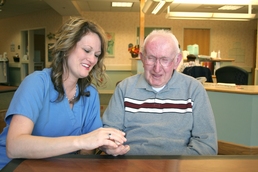Results of major Department of Health study on integration of heath care

Better integration of health care has led to improved care processes, reduced use of hospitals and more satisfied staff – say the Department of Health after a major two year study.
The Department of Health formed an Integrated Care Pilot Programme at 16 sites across England. The sites piloted different ways of integrating care, such as between general practices, community nurses, hospitals and social services.
The study found:
•Sixty per cent of staff thought they worked more closely with other team members;
•Seventy-two per cent of staff reported better communication with other organisations;
•Eighty-four per cent of staff said their job had expanded, with 64 per cent saying their role had become more interesting.
•Overall, 54 per cent of staff thought patient care had improved as a result of the pilot.
The study revealed that hospital care was needed less for patients involved in the pilot schemes where intensive case management had been introduced. This identified the elderly people at risk of hospital admission and then the coordination of care by a case manager. For those patients, outpatient visits fell by 22 per cent and planned admissions by 21 per cent. This led to savings of 9 in the overall costs of hospital care.
The pilot locations also saw increases of eight per cent in patients receiving care plans and a 9 per cent rise in those knowing who to contact with questions after being discharged from hospital.
Care Services Minister Paul Burstow said: “This two-year independent evaluation report is a valuable and welcome addition to the evidence base for integration. Many of its findings resonate with the recently published NHS Future Forum’s report on integration.
“This report is an important wake-up call, showing that actioning more integration is challenging even when organisations volunteer to collaborate. Our health reforms put in place the legal framework to support greater integration but to succeed it will require leadership at every level.”
Dr Richard Lewis, partner at Ernst & Young, and co-leader of the research said: “These evaluation results provide grounds for optimism that integrated care will deliver at least some of the hoped for benefits. The issue of poor care integration has long been highlighted as a key faultline in the NHS and the wider care system so these findings are significant.
“However, this optimism must be cautious at this stage. Change takes time and, it may still be too early to provide a complete picture of the outcomes of integrated care.
“The professional staff involved in the pilots clearly believed that integrated care allowed them to practise in a more effective way. However, the reaction of patients to integrated care is surprising. While some essential processes such as care planning have become more common, important aspects of the patient experience appear to have diminished. It may be that staff within the pilots have concentrated on improving their professional care but, in the process, lost focus on the individual patients at the centre of that care.”
Martin Roland, Professor of Health Services Research at the University of Cambridge and co-leader of the research, said: “Improvement in care processes is certainly a key benefit of integrated care, but we cannot afford to lose sight of the patient who may have a different perspective on the services they receive, such as the importance of having continuity of care from doctors and nurses.
“We have also seen how difficult it is to reduce emergency admissions for vulnerable elderly people even when everything appears to be set up to manage demand for hospital admission. This is not the first study with such findings suggesting that there may be genuine unmet need among this group of patients and that services should be planned taking this into account. However, the study also shows the potential to move other types of care from hospital into the community, for example reducing the need for outpatient attendance.”
Dr. Tom Ling, director of evaluation Rand Europe and co-leader of the research, said: “This evaluation takes us beyond the more simplistic question of ‘is integrated care good or bad’ and encourages us to look more carefully at how appropriate integration can both improve the effectiveness of health and social care and still meet the needs of service users.
“Successful integration is tough to deliver but by carefully crafting improvements to local circumstances and providing strong leadership more integrated care can help deliver real benefits for those who most need health and social care.”
Latest News
 29-Jul-24
Dementia Bus gives carehome.co.uk staff insight into life with dementia
29-Jul-24
Dementia Bus gives carehome.co.uk staff insight into life with dementia
 27-Jul-23
UK's top home care agencies in 2023 revealed
27-Jul-23
UK's top home care agencies in 2023 revealed
 30-Nov-22
A quarter of older people keep their falls secret from family
30-Nov-22
A quarter of older people keep their falls secret from family
 29-Nov-22
'Covid-19 has not gone away' say terminally ill
29-Nov-22
'Covid-19 has not gone away' say terminally ill
 28-Nov-22
IT consultant who received poor care opens 'compassionate' home care business
28-Nov-22
IT consultant who received poor care opens 'compassionate' home care business